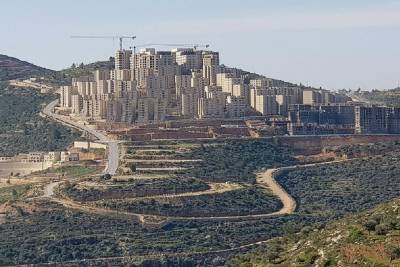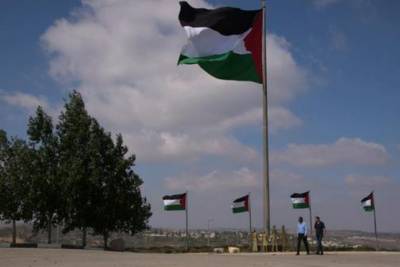Rawabi Regional Wastewater Treatment Plant Feasibility Study Launched
Zawya - Rawabi, March 9, 2011 -- Bayti Real Estate Investment Company today gave the green light to implement the feasibility study for a new regional wastewater facility for the first Palestinian planned city, Rawabi. Environmentalists hailed the news as confirmation that Bayti is taking environmental concerns very seriously.
The feasibility study will be conducted by AECOM Technology Corporation (NYSE: ACM), who won the tender to perform the study in 2010. AECOM Technology Corporation, headquartered in the US, has overseen dozens of such studies worldwide, particularly in regions where water is scarce and groundwater supplies are vulnerable.
The treatment plant will serve Rawabi's future residents as well as residents of surrounding towns and villages currently lacking wastewater treatment facilities. Reclaimed water will be used in local industry and for agricultural irrigation. Farmers in the surrounding area will enjoy significantly improved water access, which is critical to Palestinian agriculture and ultimately, to the country's food security.
The plant's operational functionalities and capacity are consistent with the Palestinian Water Authority's current water resource conservation policies and longer-term strategic plan. Water, one of Palestine's scarcest resources, is integral to Rawabi's mission. Minister Shaddad Attili, Head of the Palestinian Water Authority (PWA), confirmed that the feasibility study will be instrumental in identifying permanent solutions for the treatment of wastewater in a regional context, not only for Rawabi and surrounding towns.
The Minister further added that the PWA will take a high-level role throughout the study's life-cycle to ensure that its recommendations are in line with the PWA's overall developmental strategy for water and wastewater management. He also expected that the study will contribute to body of knowledge with regard to effective use of treated water for irrigation and local agriculture in Palestine.
Bashar Masri, Managing Director of Bayti Real Estate Investment Company, stated, "Palestine's particular political and economic situation has weakened the already fragile environment. Rawabi's goal is to reverse that decline by nurturing the environment through responsible management, which includes re-planting Palestine's vanishing tree resources, using non-reclaimable materials wisely, and doing everything within our means to conserve water."
He added, "The regional water treatment plant will use the latest in water reclamation technologies, and it underpins the larger environmental strategy we are pursuing. Palestinian food security is a huge issue which garners too little attention. One of our objectives is to bolster the work of small farmers from the nearby towns, who will in turn supply the strong market demand for fresh baladi produce from residents of Rawabi and the surrounding areas. We know that if farmers have more water, they can plant a wider range of crops over a longer growing season. Bayti is doing everything it can to help Palestinian farmers compete, further lessening our dependence on the Israeli agricultural industry."
Bayti's engineering team asserts that the regional wastewater treatment plant will produce water that meets international standards for use in irrigation and non-food agriculture, improving quality of life and expanding industrial capacity in surrounding villages and as well has allowing Rawabi to create extensive green space within the community.
The United States Trade Development Agency (USTDA), which supports growth and investment in the developing world, provided a grant to fund the implementation of the feasibility study for the regional wastewater treatment plant. The study, which will be completed over a period of eight months, will evaluate several potential sites for the plant and produce a full plan for its collection and redistribution infrastructure.
"USTDA is pleased to be a partner with Bayti Real Estate Investment Company in laying a firm foundation for environmentally sound wastewater reclamation and reuse systems for Rawabi and the surrounding communities," stated USTDA Director Leocadia I. Zak. She continued, "We look forward to working together with Bayti and the other stakeholders to ensure that Bayti has access to and recommendations for the most effective possible wastewater treatment systems for this important project. Rawabi holds great promise to support local job creation, economic development, and affordable housing opportunities in the West Bank."
-Ends
About Rawabi
The new city of Rawabi is situated 20 km to the north of Jerusalem, 25 km south of Nablus, and 70 km to the east of Amman, Jordan. Rawabi's municipal boundaries encompass 6,300,000 square meters of land, all of which is located in areas within the Palestinian Authority's jurisdiction - predominantly in Area (A), as designated by the Oslo agreement. Total construction costs are expected to exceed $800 million.
Rawabi's residential units will initially house up to 25,000 people. Additional residential and commercial units slated for subsequent construction phases will ultimately serve a city with a population of 40,000. Rawabi will also contain a mixed-use city center with commercial space that caters to information and communication technology industry to better utilize Palestine's highly educated but underemployed workforce.
Rawabi's developer, Bayti Real Estate Investment Company, is jointly owned by Qatari government-owned Qatari Diar (www.qataridiar.com) and Palestinian Massar International (www.massar.com), two companies with unsurpassed real estate development experience in both regional and international markets.
To view original article, Click Here.



